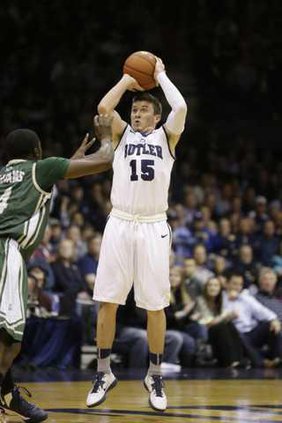INDIANAPOLIS — When Butler’s Rotnei Clarke finishes his daily shooting routine, he bombards teammates with postseason questions.
He wants to know what to expect in the NCAA tournament, how to prepare for the succession of games and what it will take to extend his career. And for a change, this fifth-year senior has far more questions than answers as he waits nervously to make his tourney debut Thursday night in Lexington, Ky.
“It’s a little different situation for me,” Clarke said. “Earlier this year, (freshman) Kellen Dunham was asking me a lot of questions about what it’s like adjusting to the college game. A lot of underclassmen had questions for me, so this is a little different.”
The good news is that Clarke will be facing 11th-seeded Bucknell (28-5) in a familiar environment -- Rupp Arena, where he came regularly during his three years at Arkansas -- and after preparing his entire life for this moment.
From as far back as he can remember, basketball was more than just a game. His father, Conley, played college basketball at Oral Roberts, his uncles all coached the game and from an early age, Rotnei Clarke just looked like a natural ballplayer. He left Oklahoma as the state’s career prep scoring leader with nearly 3,800 points, bound for Arkansas where some of his relatives lived and he was eager to play for former Kentucky star John Pelphrey.
For a kid with that kind of resume, postseason chances are supposed to come early and often.
But rather than joining the long list of unusually-named March shooting stars such as Ulysses “U.S.” Reed, Fennis Dembo and Jimmer Fredette, Clarke endured three straight losing seasons in Fayetteville and never got a chance to play in the NCAA tourney or the NIT.
In March 2011, the Razorbacks fired Pelphrey and Clarke left town for a school he hoped could, finally, get him onto the NCAA’s biggest stage. He wound up at Butler, the little school from Indianapolis that has been making upsets a tradition over the last decade and that finished as national runner-ups in 2010 and 2011. It was a perfect fit.
“He’s a great shooter,” coach Brad Stevens said. “But the thing I really enjoy is that he’s a really good teammate. “He’s devout in his faith, he lives it and everyone just enjoys being around him.”
And why not in a state and at a school where terrific shooters are treated like royalty?
There’s little doubt about what Clarke can do on the court.
Before leaving Arkansas, he was once dubbed the best pure shooter in college basketball, a moniker that comes with a heavy burden and one he has lived up to much of this season.
He banked in a buzzer-beating 3-pointer to beat Marquette in Butler’s opening game at the Maui Invitational. Against No. 1 Indiana in December, he made enough long-range jumpers to extend the Hoosiers defense and open things up on the inside. The result: An 88-86 overtime win on national television. And there have even been times where he has single-handedly carried Butler’s offense through scoring slumps.
Clarke is averaging a team-high 16.7 points while shooting 41.2 percent from 3-point range and once he crosses midcourt, he’s already in shooting range. Don’t believe it? Just ask those who watched him work his magic in the SEC or this past season when he was named to Atlantic 10 all-conference team.
Even this year, though, things haven’t always gone according to the script.
On Jan. 12, Clarke was driving for a layup at Dayton when a collision with an opposing player sent him head first into the basket support. Initially, Clarke’s body tingled and he couldn’t feel anything below his neck. He was eventually taken to a hospital where he regained the feeling and was diagnosed with a severely sprained neck.
“It’s hard not to be scared in that situation,” he said. “I was a little worried, but everyone was trying to help keep me keep a good attitude.”
He missed the second half of the Dayton game and the next three full games, with Butler losing just once during that stretch.
While he was out, Clarke was still hard at work, trying to find new ways to make himself and his teammates better.
“We have the utmost confidence in him and we know he will perform well in different situations and important situations,” senior center Andrew Smith said. “He probably has more big-game experience than any of us.”
Just not in March.
The lack of postseason experience has put Clarke in the unusual predicament of seeking advice from other players such as a 6-foot-8 Emerson Kampen, a sparsely used fifth-year senior who is Clarke’s roommate. Kampen came to Butler as a walk-on, Clarke as the most highly-touted transfers in school history.
But with Kampen, Smith and backup guard Chase Stigall the last remaining players from both Final Four trips, each has become a key resource for Clarke.
“It’s the national spotlight, it’s March Madness, it’s one of the biggest things in college sports,” Clarke said, the enthusiasm almost bursting in his voice. “It’s definitely a big opportunity. You know a lot of people still doubt this team because we had some down points and I feel like the last couple of weeks we’ve started to come together.”
And after this longest of journeys, Clarke’s only regret is that he wasn’t around for Butler’s other tourney runs.
“It’s the administration, the students, I really believe this is the best coaching staff in the country,” he said. “Once you’re at a place like this for a year, you kind of wish you had been here two, three or four years.”
Butlers Clarke finally getting postseason shot
NCAA Tournament





